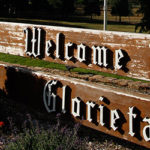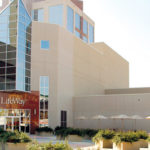NASHVILLE, Tenn. (ABP) — One in eight background checks conducted on volunteers or prospective employees through LifeWay Christian Resources found a criminal history that might have kept an individual from working or volunteering at a church, the Southern Baptist Convention publishing house reported Aug. 4.
Last year LifeWay negotiated an affinity-group discount for screening services for churches with Backgroundchecks.com , a 10-year-old company with 4,500 clients. Since then, according to a news release, about 450 churches requested more than 5,000 background checks on volunteers and prospective employees.
|
SNAP activists picketed outside the 2007 SBC annual meeting in San Antonio to draw awareness to sexual abuse by clergy. After this photo was taken, they say, an SBC official ordered them out of the shade on the convention center plaza and onto a public sidewalk in 95-degree heat and full sun. (StopBaptistPredators.org)
|
While most screenings returned clean records or only minor traffic offenses, LifeWay said, 80 found serious felony offenses and more than 600 people had some type of criminal history that may have disqualified them from volunteering or working at a church.
While not a statistically representative sample, 450 churches is 1 percent of the 44,848 Southern Baptist congregations claimed in LifeWay's most recent Annual Church Profile. Projected onto the other 99 percent of Southern Baptist churches, that would add up to 8,000 serious felony offenses and more than 60,000 people with some sort of checkered past in churches across the convention.
"It is so important in this day and time to run these checks," Barbara Strong, church secretary at Jubilee Worship Center in Westmoreland, Tenn., said in the press release. "We just don't know who is coming into our church. We'd like to think everyone is a good Christian, but we can't know that."
Since Southern Baptist churches are self-governing, the denomination doesn't screen prospective employees or volunteers for them. The SBC Executive Committee "strongly advises" churches to be diligent in choosing leaders and volunteers, however, and includes a link on the convention's website to the Department of Justice Dru Sjodin National Sex Offender Public Website.
While vital, experts say sex-offender registries alone aren't very effective in spotting sexual predators. They list only those convicted of a crime. Because victims typically are reluctant to come forward and with statutes of limitations on molestation laws in many states, only an estimated 10 percent of sexual predators are brought to justice.
Of 13,000 Catholic clergy "credibly accused" in the pedophile-priest scandal that rocked the Roman Catholic Church during the last decade, about 6 percent were even investigated by police.
According to a 2004 study by the John Jay College of Criminal Justice in New York, about 4 percent of Catholic priests who served in the United States since 1950 had been accused of sexually abusing minors.
Sign up for our weekly edition and get all our headlines in your inbox on Thursdays
While hard numbers are lacking for other religious groups, Philip Jenkins, a professor at Penn State University, has estimated the figure among Protestant clergy at between 2 percent and 3 percent.
In 2007 the Associated Press polled three major insurers for Protestant churches and totaled claims of minors being sexually abused by clergy, staff or other church-related relations at about 260 reports a year. That's a higher number than the average of the 228 credible accusations against Catholic priests per year reported in the John Jay study.
The U.S. Conference of Catholic Bishops responded to its scandal by appointing a 12-member National Review Board, a laity-led panel that monitors and reports incidents of sexual abuse by clergy.
Prodded by the Survivors Network of those Abused by Priests, the same group that pressured the Catholic Church to take action, Southern Baptist leaders last year discussed the feasibility of a similar nationwide system.
In the end, the SBC Executive Committee decided that given Southern Baptists' free-wheeling style of congregational governance, the denomination lacked "jurisdictional authority" to involve itself in receiving and evaluating reports of abuse within local churches.
Instead the Executive Committee sought to bolster awareness of the issue by creating a resource page for prevention of sexual abuse on the SBC.net website and dedicating an entire issue of SBC Life, a newspaper sent to pastors and other church leaders, to "protecting our children."
The Centers for Disease Control say background checks are only one tool in screening and selection of church workers. By themselves, they can be counterproductive, creating a false sense of security.
They recommend guidelines on interactions between individuals, such as a "6/2" rule, a policy that states anyone working with children or youth must be an active member of your church for at least six months before assuming a position of leadership and that there be at least two non-related adults in the room with minors at all times.
Other safeguards include monitoring and supervision, ensuring safe environments for children, having a plan in place to respond to inappropriate behavior and training about prevention of child sexual abuse.
The SBC Executive Committee urges churches to vigorously investigate any known or suspected incidents of abuse and to report them immediately to "governing authorities."
To delay reporting in order to avoid embarrassment to the church or to extend mercy to the accused is "unjustified" in cases involving potential child abuse, the committee says.
"Children are our precious commodity," Wayne Rogers, associate pastor of First Baptist Church in Estero, Fla., said in the LifeWay press release. "They've been entrusted to us, and we have to protect them at any cost."
–Bob Allen is senior writer for Associated Baptist Press.














We seek to connect God’s story and God’s people around the world. To learn more about God’s story, click here.
Send comments and feedback to Eric Black, our editor. For comments to be published, please specify “letter to the editor.” Maximum length for publication is 300 words.